Key Highlights
- Throat cancer is a type of cancer that refers to different types of cancer, including squamous cell carcinoma, that starts in the pharynx or larynx. The main symptoms of throat cancer can include a persistent sore throat or having trouble when you swallow.
- It is important to notice the early symptoms of throat cancer. A hoarse voice or a long-lasting sore throat could be a sign, and finding these sicgns early can help with better treatment results.
- There are mainly two main types of throat cancer, also referred to as the type of throat cancer: pharyngeal cancer and laryngeal cancer. Each kind starts in a different part of the throat.
- A few things can raise your risk of getting throat cancer. These things include tobacco use, drinking alcohol, and getting an HPV infection.
- There are several treatment options for throat cancer. These include surgery, radiation therapy, chemotherapy, and targeted drug therapy. The best treatment usually depends on the type and stage of the cancer.
Let us take a closer look at throat cancer. It is important to understand what it is and how it can affect people. Finding throat cancer early can really help. Early detection often makes the treatment work better and can give people a better chance.
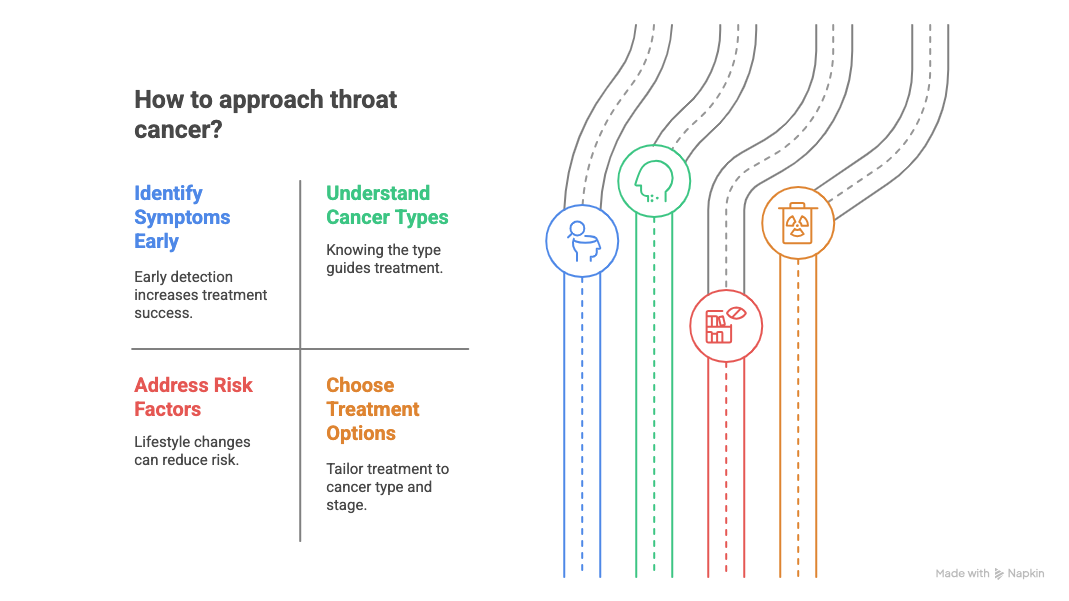
Introduction
Imagine what it would feel like if talking, laughing, or even swallowing was hard every time. That is what many people with head and neck cancer deal with. Every year, about 54,000 people get diagnosed with head and neck cancers, and many cases could be prevented. Throat cancer, which impacts the relative survival rate, is one type that can change the way you look and feel. In this post, you will get to know about the early signs, stages, risk factors, and treatment options for throat cancer and neck cancer. You will also read about ways to help stop these cancers before they start.
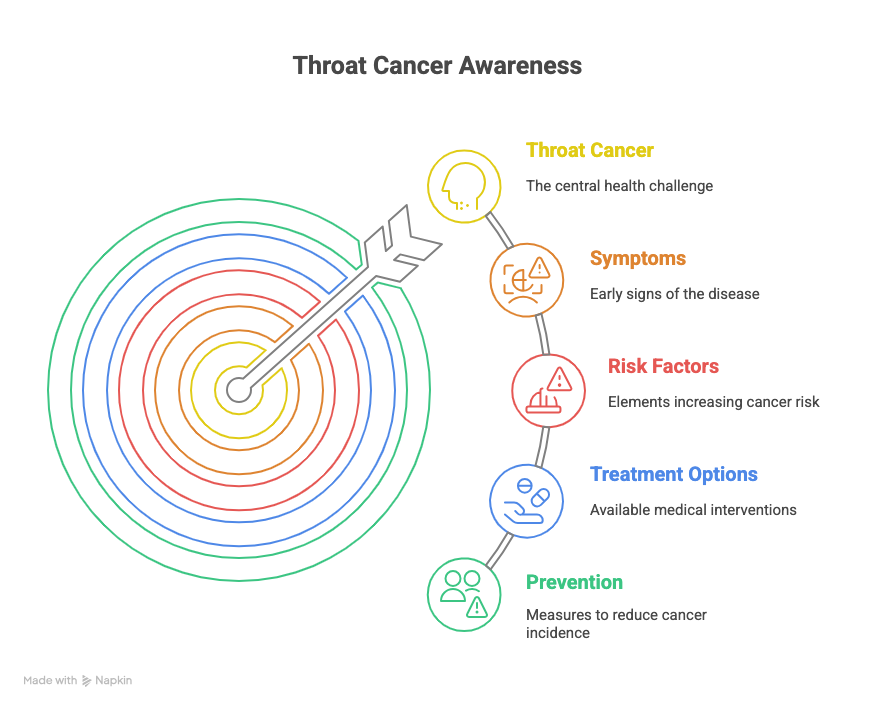
Early Warning Signs
The hard thing about throat cancer is that its symptoms can feel a lot like what you have when you get a sore throat or laryngitis. This can make early diagnosis tough. If you have a sore throat that will not go away, changes in your voice, trouble swallowing, a cough that does not end, coughing up blood, or ear pain on one side that keeps coming back, you should pay attention. This is even more true if you have any risk factors linked to throat cancer.
Risk Factors and Causes
Smoking is the number one cause of throat cancer. After that, heavy drinking and alcohol use, along with acid reflux, also raise your risk, contributing to the causes of throat cancer. There are two viruses that can connect to this cancer as well. One is the human papillomavirus (HPV), mostly Strain 16. The other is the Epstein-Barr virus. If you have a weak immune system or you are not getting enough nutrition, you can also be more likely to get throat cancer.
This cancer can affect your voice box. It can make eating, swallowing, and laughing hard for people. Many times, it forces big changes to parts of your throat and mouth.
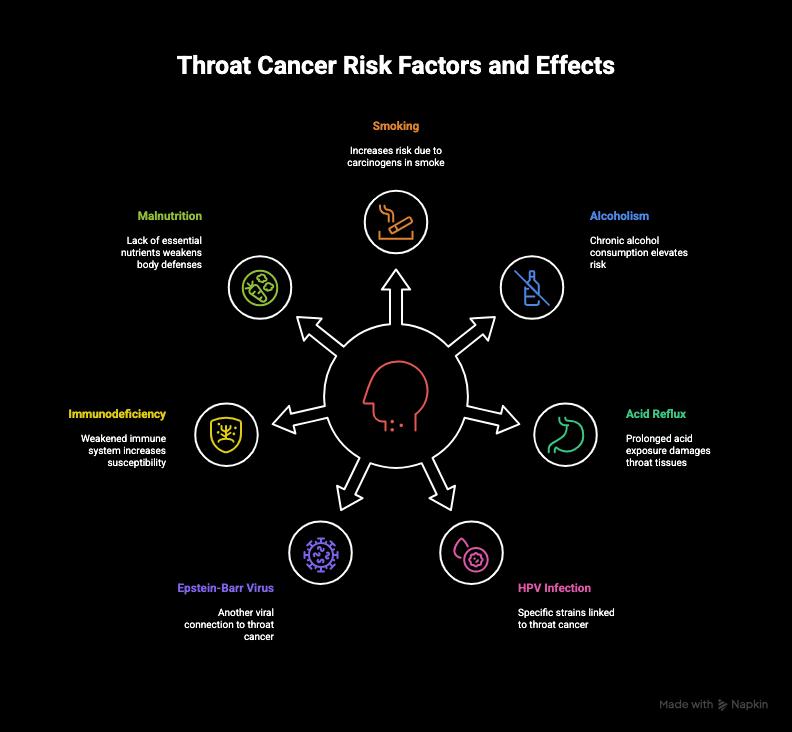
Understanding Cancer Staging
Throat cancer is sorted by a system called TNM. The T stands for tumor size. The N stands for how the lymph node is involved. The M stands for whether it has spread to other parts of the body, called metastasis. A carcinoma in situ is the least serious. It means the cancer is only in the inside lining and nowhere else. Stage one to stage four shows how much the throat cancer has grown and spread. A small size with little to no lymph node involvement means it is likely an early stage. At stage four, the cancer has gone beyond its first spot and can be in other places in the body.
Treatment and Challenges
Successful outcomes often rely on early detection. The main treatments are surgery, radiation, and sometimes chemotherapy. When the treatments are for the throat, there can be other steps involved. For example, you may need a feeding tube, which can affect your overall health and lead to more pain and trouble. The best way to guard against getting any cancer is to live a healthy life. Quitting smoking and drinking will help you stay well.
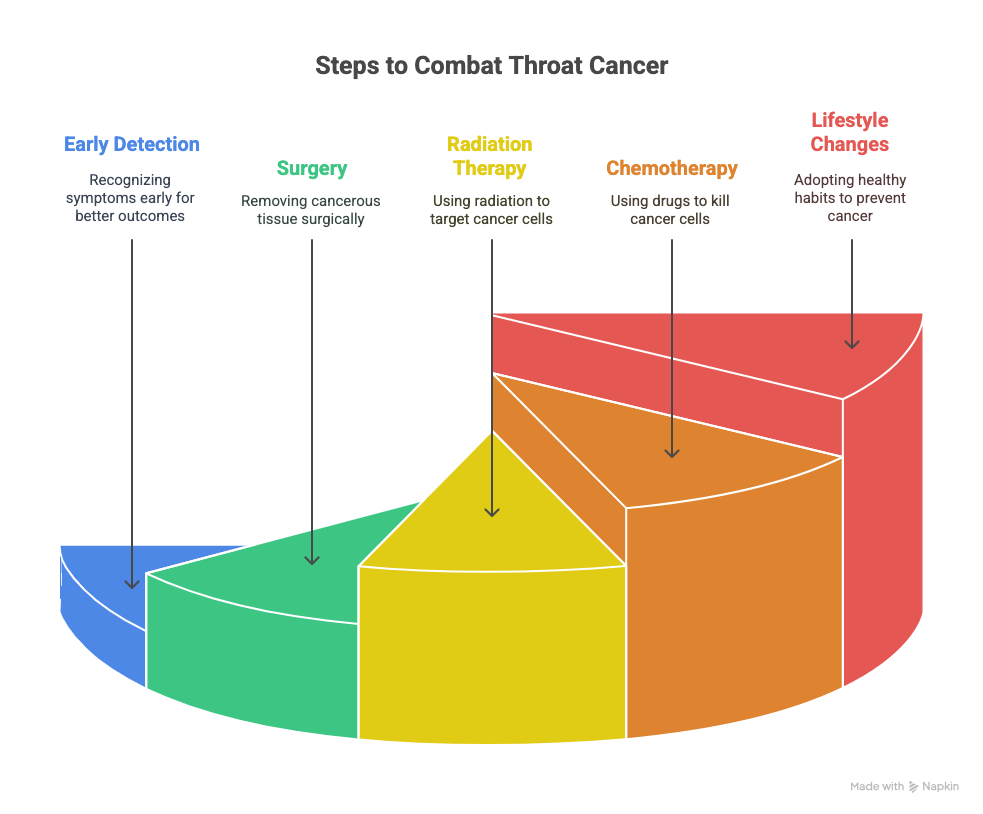
Preventive Measures
Simple lifestyle changes can really help lower your risk. Get the HPV vaccine, stop smoking, and keep your alcohol consumption in check. Taking these steps can make a big difference. Not every symptom is a sign of cancer, but it is important to pay attention and find things early. Most of all, making these changes is still the best way to prevent problems.
Final Thoughts and Advice
Throat cancer treatment can be very painful and might change the way you look. But the main way to stop it from coming back is in our hands. It makes both doctors and people who have survived feel bad when they see someone start to smoke or drink again after getting better. If you have been through throat cancer, or think you could get it, you need to stop smoking and drinking. This is the best way to avoid getting throat cancer again or getting lung cancer, since they have many of the same things that cause them.
To sum up, I want to give you a good reason to stop, catch, and treat throat cancer early. This can be done by looking out for early signs and living in a better and healthy way. Always try to know more about throat cancer, and make smart choices. These things can help keep you safe from this illness. Remember, it is possible to stop throat cancer before it starts.
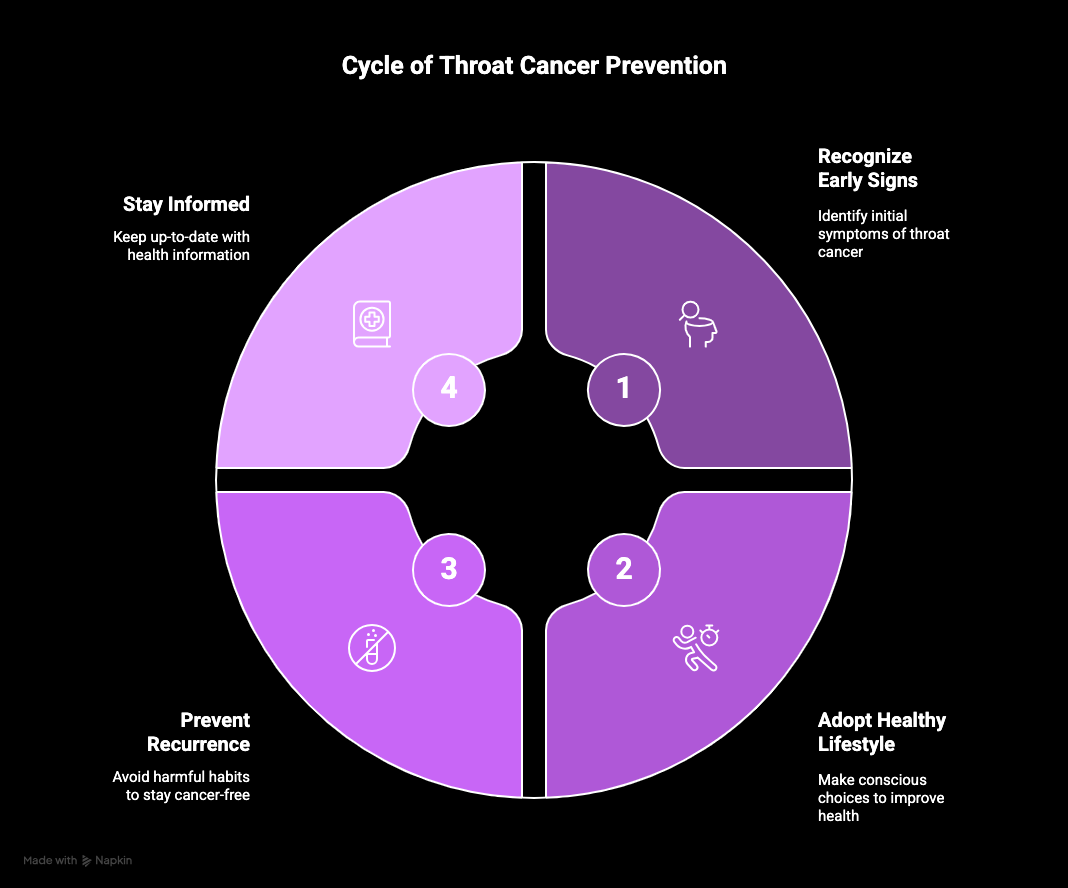
What is usually the first symptom of throat cancer?
The first thing most people see with throat cancer is pain or soreness in the throat that will not go away. You may also have trouble when you try to swallow. Your voice can sound different, or you might feel hoarseness. These common signs of throat cancer can be concerning. If you get any of these signs, it is good to visit a doctor. A doctor can check the throat to help find out what is happening.
Can throat cancer symptoms be mistaken for other illnesses?
Yes, throat cancer symptoms can look like signs of other sicknesses. You might think the signs you feel are from allergies, infections, or gastroesophageal reflux disease. Because these signs are so much the same, it may take more time to know if you have throat cancer. That is why it is very important to see a doctor if you notice any throat cancer symptoms that keep going or make you feel worried.
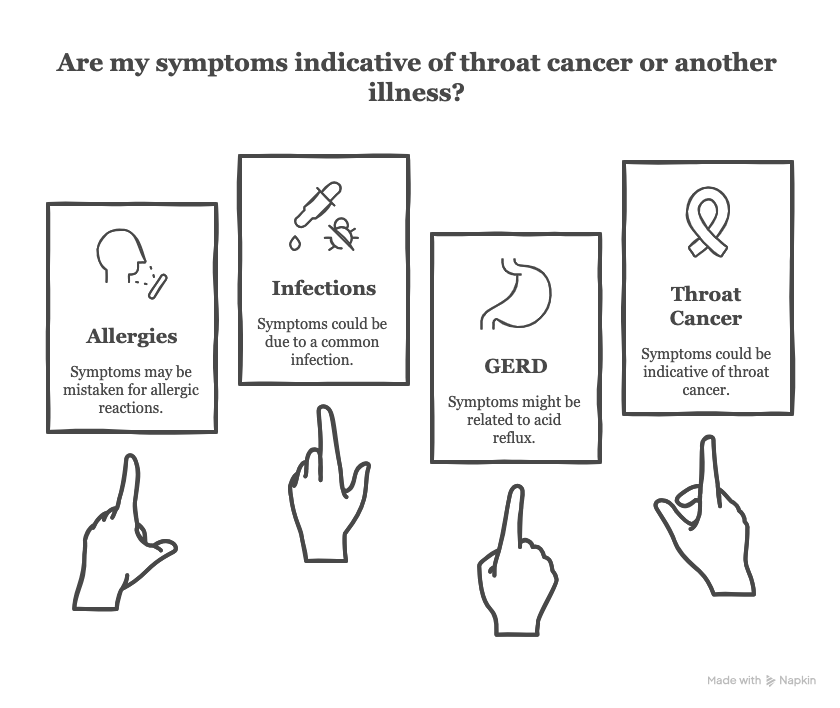
Is throat cancer hereditary?
While throat cancer is not something you get from your parents, there are some genetic changes in genes that can make people more likely to get it. If anyone in your family has had cancer, especially cancer involving cancerous cells in the head and neck, your risk may be higher. It is important to tell your doctor if someone in your family has had cancer. This will help the doctor know more about your risk for throat cancer and give you the best help and advice.
How are throat cancer symptoms different in men and women?
Throat cancer can look different in men and women because their bodies are not the same. Men might notice throat cancer symptoms such as hoarseness more often than women. On the other hand, women may feel more tired or have a sore throat instead. It is important to know about these changes in throat cancer symptoms. This helps people get the right diagnosis faster, so they can start treatment sooner.
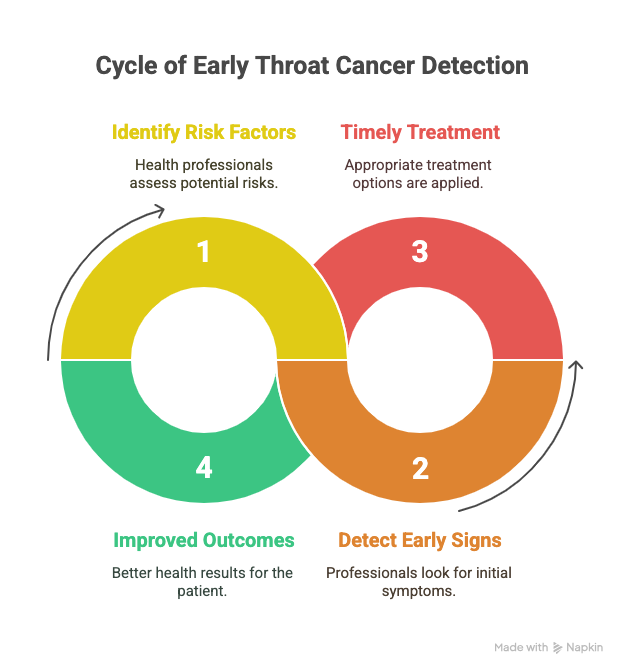
Can throat cancer be detected early through routine check-ups?
Routine check-ups can help people find throat cancer early. When you visit the doctor, they look for things that might show risk or early signs. By going to these check-ups, you can spot problems before they get bad. Finding issues early means you can get throat cancer treatment options and possibly necessary blood tests and diagnostic tests right away. This can also help to make sure the treatment works well for the person.


